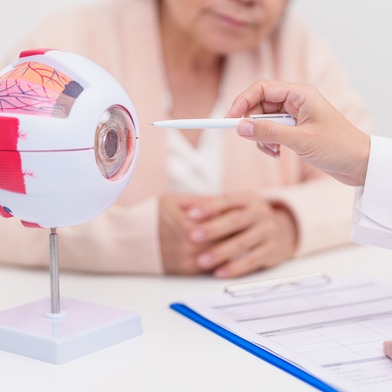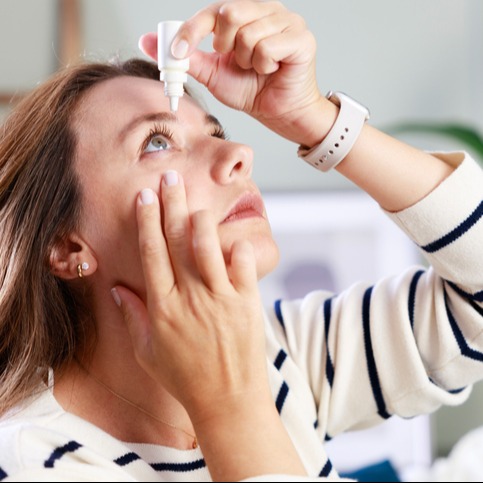
Dealing with dry macular degeneration can be tough. Right now, we're focused on slowing its progress and making life better through different approaches. Approved options like Pegcetacoplan and Avacincaptad Pegol offer targeted help, and vitamins play a big part too. Making smart lifestyle choices and finding ways to cope also help folks manage this condition. Knowing all your choices can lead to better care and results. What's next in the world of new treatments?
Key Takeaways
Approved treatments such as Pegcetacoplan and Avacincaptad Pegol target geographic atrophy in dry macular degeneration.
High-dose vitamin supplements from the AREDS2 formula, including vitamins C and E, help slow progression.
Light therapy is a non-invasive option approved by the FDA to protect retinal cells.
Lifestyle changes, such as a diet rich in fruits and vegetables and quitting smoking, are crucial for eye health.
Regular eye exams and low vision aids can enhance quality of life for those with central vision loss.
Current Treatments and Therapies
Current treatments and therapies for dry macular degeneration are mainly about slowing down the disease rather than bringing back vision that's already gone. Recent breakthroughs include the approval of Pegcetacoplan and Avacincaptad Pegol, which are effective at slowing the spread of geographic atrophy in more advanced cases. Plus, high-dose vitamin supplements, specifically the AREDS2 formula, are recommended to lower the risk of losing vision. Light therapy has also received FDA approval as a non-invasive treatment, using specific light waves to protect vision without needing shots. What's more, ongoing studies are exploring new treatments that target the root causes of geographic atrophy. We encourage patients to make lifestyle changes, like quitting smoking and eating plenty of antioxidant-rich foods, to boost overall eye health and potentially delay the disease's progression.
Nutritional Supplements and Lifestyle Modifications
As treatments for dry macular degeneration advance, it's clear that complete care involves both nutritional supplements and lifestyle changes. Research suggests that supplements based on the AREDS2 study, which include vitamins C and E, zinc, copper, and lutein, might help slow down the disease. Eating a diet packed with fruits and vegetables, especially those high in antioxidants, is great for eye health and can help slow progression. Adding omega-3 fatty acids from sources like salmon and flaxseed might offer extra anti-inflammatory benefits. And importantly, quitting smoking is essential, as smokers have a higher chance of developing and speeding up macular degeneration. Staying active and keeping a healthy weight also contribute positively to your overall eye health, reducing related risk factors.
Emerging Treatments and Research
With research constantly moving forward, new treatments for dry macular degeneration are bringing fresh hope to patients facing this difficult condition. Recent FDA approvals for Pegcetacoplan (Syfovre™) and Avacincaptad Pegol (IZERVAY™) have shown significant promise in tackling geographic atrophy, with clinical trials indicating reduced lesion growth. Light therapy, another innovative approach, uses specific light wavelengths to safeguard retinal cells. Current research is also exploring gene therapy and advanced drug delivery methods for even more effective treatments.
Treatment | Description |
Pegcetacoplan | Monthly or bimonthly intraocular injections |
Avacincaptad Pegol | Every three months injection |
Light Therapy | Non-invasive method using specific light wavelengths |
Coping Strategies and Support
While new treatments offer hope, individuals living with dry macular degeneration often need practical ways to manage their everyday lives. Consistent eye care, including updating eyeglass prescriptions, is crucial as vision can change. Using magnifying tools and electronic reading aids can boost independence for reading and daily tasks. Better lighting at home also helps with visibility, especially for those experiencing central vision loss. Connecting with low vision rehabilitation specialists provides tailored strategies to adapt to vision loss, ultimately improving quality of life. Additionally, joining support groups or reaching out to organizations like the BrightFocus Foundation offers vital resources and emotional backing, creating a sense of community for those navigating the challenges of macular degeneration.
Preparing for Your Appointment
How can you get ready for an appointment about dry macular degeneration? Preparation involves a few key steps to make sure you have a thorough discussion about your eye health. Patients should book a complete eye exam, including a dilated exam, and bring a list of any symptoms, medications, and supplements they're taking. It's helpful to have a family member or friend come with you for support and to help remember the information. Also, be sure to think of questions you want to ask about treatment options and lifestyle changes.
Preparation Step | Details | Purpose |
Schedule Eye Exam | Complete and dilated | Check for macular degeneration |
List Symptoms and Medications | Document all health details | Provide a comprehensive overview |
Bring a Companion | Family member or friend | Assist in understanding |
Prepare Questions | Inquire about treatments | Clarify health concerns |
Discuss Family History | Share relevant history | Guide diagnosis and treatment |
Frequently Asked Questions
What Is the Latest Treatment for Dry Macular Degeneration?
The newest treatments for dry macular degeneration include Pegcetacoplan (Syfovre™) and Avacincaptad Pegol (IZERVAY™), both given by injection. These therapies aim to slow down the disease's progression and improve vision outcomes, showing promising results in clinical trials.
How Long Does It Take to Lose Vision With Dry Macular Degeneration?
"Time waits for no one." Vision loss from dry macular degeneration can happen slowly over several years. Some people might experience significant vision problems within five years, while others may stay stable for much longer.
How to Slow Dry Macular Degeneration?
To slow down dry macular degeneration, it's important to live a healthy lifestyle. This includes eating a balanced diet rich in antioxidants, quitting smoking, taking recommended supplements, and going for regular eye exams to keep track of any changes and address them.
How Serious Is Dry Macular Degeneration?
"An ounce of prevention is worth a pound of cure." Dry macular degeneration can be serious, leading to gradual vision loss that makes daily tasks difficult. This highlights the importance of early detection and proactive management strategies.
Count on https://drugmart.com When You Need to Import Prescription Drugs Through Canada When you work with https://drugmart.com, ordering medicine through Canada is easy, safe and cost-effective. You can rely on our reputable network of pharmacies to deliver the authentic drugs you need. If you're ready to import prescription drugs through Canada and our other verified international pharmacies, you can start today by browsing our available medications.
Sources
Anastassiou, G., Schneegans, A., Selbach, M., & Kremmer, S. (2013). Transpalpebral electrotherapy for dry age-related macular degeneration (amd): an exploratory trial. Restorative Neurology and Neuroscience, 31(5), 571-578.https://journals.sagepub.com/doi/10.3233/RNN-130322
Moutray, T. and Chakravarthy, U. (2011). Age-related macular degeneration: current treatment and future options. Therapeutic Advances in Chronic Disease, 2(5), 325-331. https://journals.sagepub.com/doi/10.1177/2040622311415895
Somasundaran, S., Constable, I., Mellough, C., & Carvalho, L. (2020). Retinal pigment epithelium and age‐related macular degeneration: a review of major disease mechanisms. Clinical and Experimental Ophthalmology, 48(8), 1043-1056. https://onlinelibrary.wiley.com/doi/10.1111/ceo.13834





